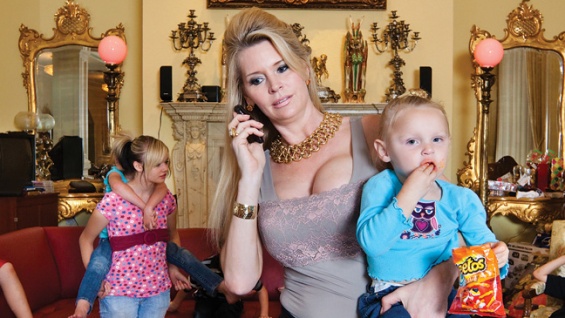Director: Lauren Greenfield,
Watched in: Theater,
Rating: 3/5.
The rich are different than you and me. For one thing, they have more money. For another, they don’t seem to know what to do with it. In the new documentary, The Queen of Versailles, we get to watch a filthy rich couple prance then stumble through the wreckage of the economic recession without ever really coming to terms with the grotesque side effects of greed. Their false compassion for the less fortunate, their switch from shopping sprees at Saks to shopping sprees at Wal-Mart, their firing of a few expendables from their platoon of nannies, these are their ideas of sacrifice. What makes The Queen of Versailles fascinating is the attempt by the filmmakers to tease out our sympathies for people we find appalling.
David and Jackie Siegel live in Orlando in a vast McMansion that is bursting at the seams with 8 kids, several poodles, an army of helpers, rooms full of disposable possessions and walls plastered with gawdy vanity portraits. When the film’s director, Lauren Greenfield, got wind of the Siegel’s plans to build a new crib, a 90,000 square-foot replica of the palace at Versailles, which would make it the largest house in the country, she convinced the couple to let her make a movie about wealth and consumerism in America. Jackie Siegel, with her huge manufactured breasts and skin-tight designer shorts, siezes the role of star and tour guide. She unapologetically leads Greenfield and her crew on an entertaining cruise through her daily grind of botox shots, treadmill workouts, fast-food gorge-outs, perfunctory parental nods in the direction of her spoiled, diasffected herd of children, and a quick recounting of her upbringing from poor girl to exploited model to trophy wife of David, who is 31 years older than Jackie and the owner of the most successful time-share corporation in the world.
Jackie is a documentarian’s dream, the subject whose sense of irony is far less developed than the filmmaker’s. When the recession finally hits the time-share industry and David’s empire begins to crumble, Jackie happily reshuffles priorities. She scolds her kids for letting their pet lizard die and chuckles over the dog feces left on the floor because she laid off the housekeeper who used to scoop up the poop. She shops at a thrift store, succumbs to flying in a commercial plane rather than their private jet, and even rents a car that she has to drive herself. David, meanwhile, grows depressed and onery, but part of his crankiness is directed at the camera crew. He just wants to be left alone.
David seems to understand that what is happening to his fortune is more important then the making of a film about it, but Jackie, a mile wide and an inch deep, is immune to the outlandish picture she is presenting. When she goes Christmas shopping at Wal-Mart and fills a fleet of carts with board games and toys her children don’t need and don’t even want, it results in a dispiriting scene of bored kids opening presents that have absolutely no personal or intimate value. To me, this says everything the movie needs to say about how the rich take money for granted. Where your average middle class family budgets for car payments, health insurance and their one precious vacation a year, the wealthy purchase extravagant, unnecessary crap. Paul Allen may own the most powerful, well-constructed, artfully designed yacht in the history of seawater, but it is still just a rich man’s idea of a bath toy.
By the end of The Queen of Versailles, the Siegel’s riches may have diminished but not their gift for self-parody. Director Greefield’s attempts at a well-rounded, empathetic study of one family’s financial collapse is entertaining, but it doesn’t result in any kind of self-realization or change of heart. The movie pokes a little fun at the Siegels, invites our sympathy and also welcomes our revulsion. But in the end this queen and her king, their royal brood and court of serfs, will get along just fine without a few less time-share condos and their gargantuan playhouse. In an America where the rich are protected by tax shelters, loopholes and government toadies, the Haves rarely, if ever, become the Have-nots.

